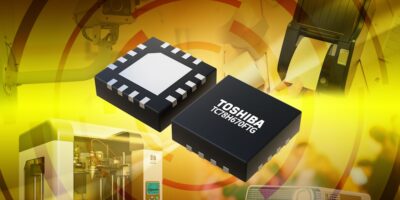Micro-stepping motor driver IC has integrated current sensing
Silent operation, despite a high motor current are characteristics of the TC78H670FTG micro-stepping motor driver IC. The latest member of Toshiba Electronics Europe’s motor driver ICs family is a dual channel model intended for a variety of consumer applications including 3D printers, cameras, security cameras, portable printers, handheld scanners, pico-projectors and battery powered medical devices.
The IC can drive a micro-stepping motor of up to 128 steps and with a voltage ranging from 2.5V to 16V at currents of up to 2A. The output on-resistance is only 0.48 Ohms by virtue of Toshiba’s latest CDMOS process, says the company. This reduces voltage loss and heat generation inside the driver. An ultra-low standby current of just 0.1 microA prolongs battery life. It can operate with a 1.8V to 5.0V interface to allow connection to a variety of hosts and microcontrollers, allowing it to be used in USB-powered and battery-powered applications as well as with standard 9V to 12V system devices.
The micro-stepping control allows motors to be operated smoothly and quietly with reduced vibration and improved rotation angle accuracy. Safety features such as over-current detection, thermal shut down and open-load detection are incorporated.
The motor driver is housed in a compact QFN16 package with a footprint of 3.0 x 3.0mm, which eliminates the two conventional, bulky and expensive current sense resistors by incorporating on-chip current detection. This represents “significant cost and space saving” in designs, says Toshiba.
The TC78H670FTG is in mass production today.
Toshiba Electronics Europe (TEE) is the European electronic components business of Toshiba Electronic Devices and Storage. TEE offers European consumers and businesses a variety of innovative hard disk drive (HDD) products and semiconductors for automotive, industrial, IoT, motion control, telecoms, networking, consumer and white goods applications. The company’s portfolio encompasses integrated wireless ICs, power semiconductors, microcontrollers, optical semiconductors, ASSPs and discrete devices ranging from diodes to logic ICs.
TEE has headquarters in Düsseldorf, Germany, with branch offices in France, Italy, Spain, Sweden and the United Kingdom providing design, manufacturing, marketing and sales.




